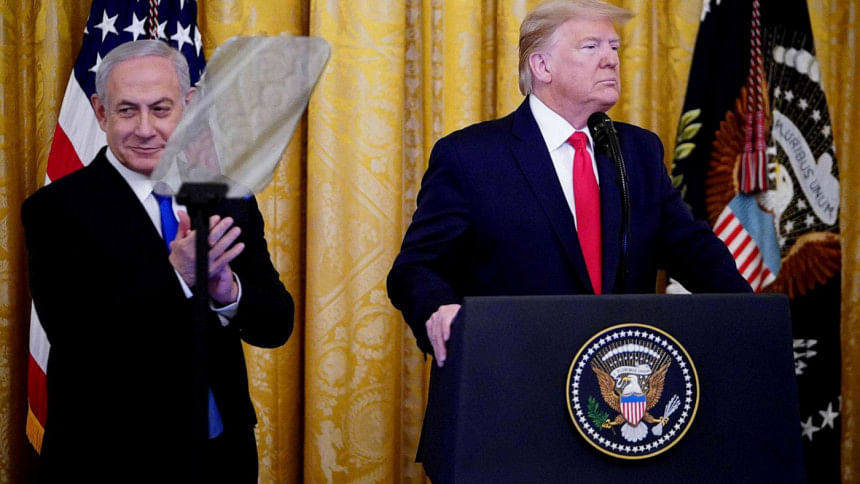A recipe for further conflict

Like many of President Trump's actions in the last three years, the recently rolled out "Deal of the Century" is a farce. The so-called peace plan was crafted by the President's son-in-law over the last three years, drawn up without the participation of the only other stakeholder—the Palestinians. The provisions of Trump's Middle East plan are at best a travesty and comes as no surprise to either of the parties, nor to the rest of the world; and the timing of the announcement may not be entirely coincidental either.
President Trump has really lived up to Netanyahu's description of him as "the greatest friend that Israel has ever had in the White House." Israel (and of course Netanyahu personally) owes Trump and his chief negotiator and son-in-law, Jared Kushner, "an eternal debt of gratitude,"given that on the very day that the US President, himself under impeachment, was handing over virtually the state of Palestine to Israel, the Israeli PM was also indicted on charges of corruption.
US endorsement and support of Israeli policy reminds one of the early stages of colonialism when Pope Alexander IV divided the New World between Spain and Portugal through the papal bull Inter Caetera in 1493, which granted the two countries sovereignty over their overseas possessions, making them the colonies of these two nations. The difference is, we have Donald Trump instead of the Pope and the "Peace to Prosperity" plan instead of the papal bull, doing exactly what the Pope did—give lands to Israel that does not belong to it, much like the Pope who gave unto Spain and Portugal lands that did not belong to them.
How viable can any plan be without the participation of one of the main interlocutors? How relevant and feasible is the plan contained in a 181-page document titled "Peace to Prosperity: A Vision to Improve the Lives of the Palestinian and Israeli People"? It reads like an obituary to the very foundation of the solution—the two state solution. It is a plan drawn up secretively with Israel by a person unfit for the job and without a sense of history who sees the world in the prism of 2020; it was handed down to Palestine as fait accompli, offering the Palestinians a country without its sovereignty, its capacity to protect itself totally curbed and its security outsourced to Israel, since it wouldn't be allowed to have its own army or air force.
According to the Foreign Policy, the plan demands very little of Israel while allowing it to annex strategic occupied land in the West Bank. What the US has done through this plan, more damagingly though, is to renege on its own longstanding policy that any final solution of the problem will be based on the borders between the two states of 1967, predating the illegal annexation of Arab lands following the 1973 Arab Israeli war.
The latest Trump plan is part of the process of fulfilling his avowed election policy relating to the Middle East, of validating the annexation by Israel of Arab and Palestinian territories, including recognition of the Golan Heights and shifting of the US Embassy from Tel Aviv to Jerusalem. It conforms, too, with what Netanyahu had vowed when he first became PM. Annexation of occupied territories was the objective he never made a secret of; his position against Palestinian statehood was well known, and he went out of his way to manufacture lies about Iran's nuclear capability after Trump came to office. It was not difficult to convince a US president whose mind on the issue was already made up, to cancel the deal.
So how much progress or peace will it bring for Israel and Palestine? Particularly a deal drawn up by a country who, by reformulating its policies and repositioning its stance on the Palestine issue, has lost all credentials as an honest broker? By validating Israeli annexation, the US has become a party to the conflict. Thus, can it ink a plan that essentially violates not one but dozens of UN resolutions on Palestine? Can it carve up territories and land belonging to one country and give it to another?
What the US has actually done is wrap the long term Israeli plan inside a glossy looking peace plan, which engenders no prospect of peace but accentuates the possibility of further violence in the region. Do the Palestinians have any other option than to reject it out of hand, which they had done well before it was formally announced by Trump on January 28? The purpose, regrettably, is not peace but to push the Palestinians up against the wall, compel them to reject it and then paint them as rejectionists.
The world must read between the lines of this document. What it aims to do is reduce the Palestinians to a vassal of Israel, imprisoned by their obligations to Israel for security. The treaty has trodden on the sentiments of the Palestinians and reduced them into a political nonentity. The plan endorses illegal occupation, the deprivation of rights of a people to their own land and the right of refugees to return to it. No wonder the plan, as one commentator described it, is DOA—Dead on Arrival.
Shahedul Anam Khan is former Associate Editor,
The Daily Star.

 For all latest news, follow The Daily Star's Google News channel.
For all latest news, follow The Daily Star's Google News channel. 



Comments